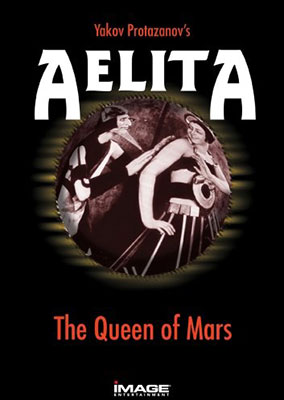
Reviews of silent film releases on home video.
Copyright © 1999-2025 by Carl Bennett
and the Silent Era Company.
All Rights Reserved. |
|
Aelita
The Queen of Mars
(1924)
|
B-film science fiction movies of the 1950s had a tradition of standing-around-the-lab talkiness and not enough of “the good stuff.” Aelita: The Queen of Mars, like so many of the low-budget science-fiction movies that would follow it years later, remains earthbound for the majority of the film, only occasionally teasing the viewer with the Mars stuff.
Aelita requires the viewer to not only remember the traditions of silent era films and of science-fiction films, but also the constricting requirements Russian filmmakers had imposed upon them by the Soviet regime in the 1920s. Keep in mind also that Aelita may be the only example of an extremely rare genre of motion pictures: a silent Soviet science-fiction film. This alone warrants the film’s viewing. Ground-breaking costume design that brings to mind the later Things to Come (1936) and the Flash Gordon serials of the 1930s is major point of interest.
Aelita is largely the story of Loss, a radio station engineer, and his wife, Natasha. Despite his consuming obsession with a mysterious radio signal that is jokingly assumed to have come from Mars, Loss is furiously jealous of the attentions being given to Natasha by Erlich, a low-ranking and corrupt Soviet official who pines for his luxurious prerevolution lifestyle. Loss vascillates without reason between being a scientist of things Martian and a furious and earthly husband. Loss copes with his problems by running off, with a mopey and withdrawn expression, to direct a grand Soviet construction project (which he, as a radio engineer, is perfectly qualified to do). Loss then assumes the identity of a Soviet co-worker (run out of town by Erlich’s own wife), secretly builds a rocket missile, kills Natasha and then travels to Mars with a bored soldier and a would-be detective in tow. The aliens from the Earth bring to the enslaved workers of Mars the liberating revelation of socialism and thwart a class-based power struggle. Ultimately Loss returns to Earth to once again get down to the noble cause of rebuilding Soviet Russia.
Sprinkled throughout this slightly absurd melodrama is the Martian component. Aelita (Yuliya Solntseva) is the queen of Mars, yet is powerless against the council of elders. Her struggle against the council takes a backseat to her fascination with a viewing device that allows the study of everyday life on Earth. She becomes obsessed with an Earth man (Loss, of course!) when she sees him kiss his wife. The leader of the council attempts to exert his control over Aelita by denying her access to the viewing device. She finds ways around that restriction while the council orders a third of the Martian workforce to be sent to the freezers. Yeah, now this is making sense!
Let us forget the many weaker points of the story, such as Loss having the expertise and the resources to secretly build a rocketship within the Moscow city limits. Aelita is, nonetheless, a tremendous accomplishment in light of the circumstances of its production. Somehow, with the limited resources available to the Russian production company, scarce metals and materials were obtained to build the exotic Mars sets, thousands of extras were costumed and utilized, and more than 60,000 feet of raw footage was taken. One of Russia’s foremost film directors, Yakov Protazanov, willingly returned from artistic exile in Germany and France to jump into this ambitious and occasionally cinematically-visionary project.
Aelita is a curio today, with much of its inherent value being its Martian vision. The sets are interesting but seem cheap and even numbingly familiar to modern eyes. Of principal interest is the costume design, with the headpieces worn by Aelita and the cagelike outfit worn by her maid being the standouts. The soldiers’ costume designs anticipate the tried-and-true science fiction raygun with forearm-mounted flashing-light weapons utilized against the workers of Mars.
— Carl Bennett
|
 Flicker Alley Flicker Alley
2017 DVD edition
Aelita: The Queen of Mars (1924), black & white, 111 minutes, not rated.
Flicker Alley, distributed by MovieZyng,
FA-MD3-004, UPC 8-89290-09094-2.
One single-sided, single-layered, Region 0 NTSC DVD-R disc; 1.33:1 aspect ratio picture in full-frame 4:3 (720 x 480 pixels) interlaced scan image encoded in SDR MPEG-2 format at ? Mbps average video bit rate (capable of progressive scan upscaling to ? fps); Dolby Digital (AC3) 2.0 stereo sound encoded at ? Kbps audio bit rate; English language intertitles, no subtitles; chapter stops; standard DVD keepcase; $19.95 (raised to $21.99).
Release date: 14 March 2017.
Country of origin: USA
|
|
This DVD-R edition has been mastered from a very-good quality but soft duplicate 35mm print. This edition replaces the 1999 Image edition noted below.
The film is presented with a modern piano score by Alexander Rannie (based on Prokofiev themes).
|
|
This Region 0 NTSC DVD-R edition is available directly from FLICKER ALLEY through . . .
|

|
|
 Film Preservation Associates Film Preservation Associates
1999 DVD edition
Aelita: The Queen of Mars (1924), black & white, 111 minutes, not rated.
Film Preservation Associates, distributed by Image Entertainment, ID5665DSDVD, UPC 0-14381-56652-9.
One single-sided, single-layered, Region 0 NTSC DVD disc (reissued on DVD-R disc); 1.33:1 aspect ratio picture in full-frame 4:3 (720 x 480 pixels) interlaced scan image encoded in SDR MPEG-2 format at 4.5 Mbps average video bit rate (capable of progressive scan upscaling to 60 fps); Dolby Digital (AC3) 1.0 mono sound encoded at 192 Kbps audio bit rate; English language intertitles, no subtitles; 18 chapter stops; snapper DVD case (rereleased in standard DVD keepcase); $24.99.
Release date: 20 July 1999.
Country of origin: USA
Ratings (1-10): video: 6 / audio: 6 / additional content: 0 / overall: 6.
|

On DVD Aelita plays well, with a very-good quality but soft duplicate 35mm print being used for the full-frame video transfer. A contrasty and soft 16mm print was used for the transfer of one shot missing from the 35mm print of the film. Good tonal range and a slight softness in picture detail are characteristic of the source print, and while occasional print damage and speckling from dust on the negative is seen throughout, it is rarely distracting.
Although the DVD has been released through Image Entertainment it contains the same analog video-based intertitles and modern piano score by Alexander Rannie (based on Prokofiev themes) featured on Aelita’s 1991 Kino International home video release on VHS videotape (not surprising since the “Kino International release” title still starts this video program). The Dolby 1.0 mono sound will emanate from the center channel speaker only on a surround sound system.
Video producer David Shepard has once again done his best to make the finest and most complete surviving prints of silent era films available on DVD home video. Our reevaluation on high-definition equipment leaves us with our original quality rating.
The edition was reissued on DVD-R disc; it is now out-of-print and is replaced by the Flicker Alley edition noted above.
|
This Region 0 NTSC DVD-R edition has been discontinued
and is . . .
|

|
|
 Nostalgia Family Video Nostalgia Family Video
2010 DVD edition
Aelita: The Queen of Mars (1924), black & white, 111 minutes, not rated.
Nostalgia Family Video, 2929D, unknown UPC number.
One single-sided, single-layered, Region 0 NTSC DVD-R disc; 1.33:1 aspect ratio picture in full-frame 4:3 (720 x 480 pixels) interlaced scan image encoded in SDR MPEG-2 format at ? Mbps average video bit rate (capable of progressive scan upscaling to ? fps); Dolby Digital (AC3) 2.0 mono sound encoded at ? Kbps audio bit rate; English language intertitles, no subtitles; no chapter stops; clamshell CD case; $14.99.
Release date: 2010.
Country of origin: USA
|
|
This DVD-R edition was likely mastered from a 16mm reduction print.
The disc had no navigation menu, chapter stops or package artwork and was sold in a clear clamshell case.
|
NOSTALGIA FAMILY VIDEO has discontinued business
and this DVD-R edition is . . .
|

|
|
|
Other silent era YAKOV PROTAZANOV films available on home video.
Other RUSSIAN and SOVIET FILMS of the silent era available on home video.
Other SCIENCE FICTION and FANTASY FILMS of the silent era available on home video.
|




































